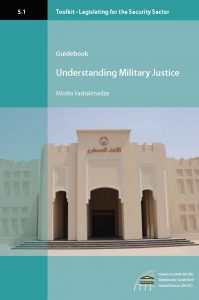
The objective of this guide is to provide readers with essential information about the function and principles of military justice in a democratic society. The guide also focuses on policies and the role of different stakeholders in shaping legal and institutional frameworks for an effective and transparent system of military justice. It provides an overview of different military justice systems and outlines the challenges they face.
For more information please
download the document Eng
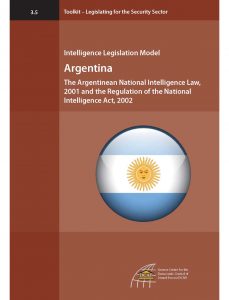
This booklet contains The Argentinian National Intelligence Law, 2001 and the Regulation of the National Intelligence Act, 2002 in its original form as well as the provisions of this legislation which are reorganised by topic. This allows lawmakers to easily identify the specific subjects that should be covered by legislation on intelligence services and compare different laws according to particular topics.
For more information please
download the document Eng
Legislating for the Security Sector Toolkit: The Netherlands’ Intelligence and Security Services Act
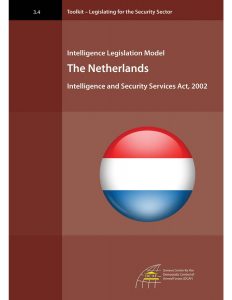
This booklet contains the Dutch Intelligence and Security Services Act in its original form as well as the provisions of this legislation which are reorganised by topic. This allows lawmakers to easily identify the specific subjects that should be covered by legislation on intelligence services and compare different laws according to particular topics.
For more information please
download the document Eng
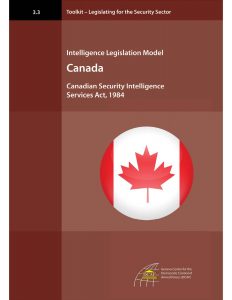
This booklet contains the Canadian Security Intelligence Service Act in its original form as well as the provisions of this legislation which are reorganised by topic. This allows lawmakers to easily identify the specific subjects that should be covered by legislation on intelligence services and compare different laws according to particular topics.
For more information please
download the document Eng
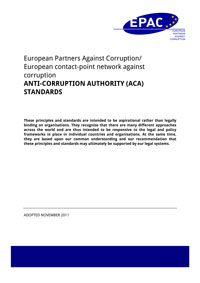
This document lists ten guiding principles and parameters on the notion of independence of Anti-Corruption bodies. These principles and standards are intended to be aspirational for, rather than legally binding on, organisations. They recognise that there are many different approaches across the world and are, thus, intended to be responsive to the legal and policy frameworks established in individual countries and organisations.
For more information please
download the document Eng
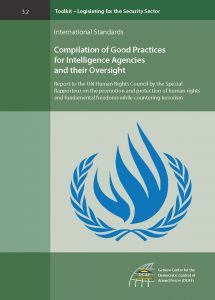
The Compilation of Good Practices within the Security Sector Toolkit highlights the legal and institutional frameworks and measures that ensure respect for human rights by intelligence agencies while countering terrorism. The toolkit also identifies international standards for intelligence governance.
For more information please
download the document Eng
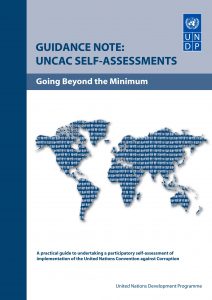
The UN Convention Against Corruption Self-Assessment process is an opportunity to engage in national dialogue on anti-corruption policies and programmes and stimulate reforms to curb corruption. This practical Guidance Note provides a methodology for national stakeholders on how to conduct a comprehensive and participatory Self-Assessment of UNCAC implementation.
For more information please
download the document Eng
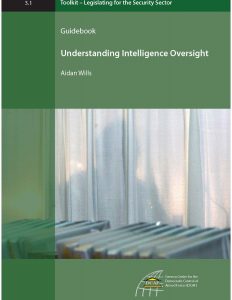
This guidebook provides an introduction on how democratic states govern their intelligence services. The toolkit demonstrates how states can govern their intelligence services in order to make sure that:
- They contribute effectively to the security of the state and its population,
- They are subject to democratic control,
- They are accountable to the populations they serve, and
- They respect the rule of law and human rights.
The guidebook provides short and simple answers to frequently asked questions on the activities of intelligence services, as well as the control and oversight of these
For more information please
download the document Eng
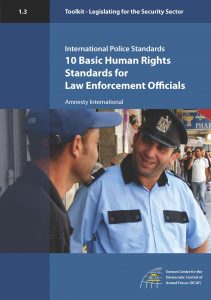
These ‘10 Basic Human Rights Standards for Law Enforcement Officials’ were prepared by Amnesty International in conjunction with police officials and experts from different countries. They are based on United Nations law enforcement, criminal justice and human rights standards. This document is intended to raise awareness amongst government officials, parliamentarians, journalists and non-governmental organizations of some fundamental standards which should be part of any police training and police practice.
For more information please
download the document Eng
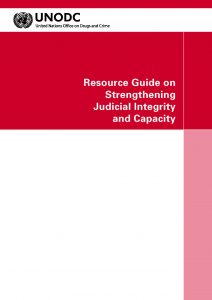
The purpose of this Guide is to support and inform those who are tasked with reforming and strengthening the justice systems of their countries. The Resource Guide also aims to provide development partners, international organizations, and other providers of technical assistance who deliver support to this process.
For more information please
download the document Eng
Page 4 of 8



